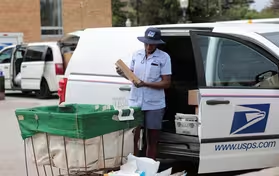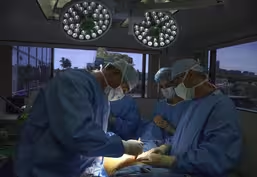
Aid worker in Gaza sees sharp rise in malnourished children
Clip: 7/26/2025 | 5m 42sVideo has Closed Captions
Aid worker in Gaza sees ‘catastrophic’ rise in malnourished children and families
As deaths from hunger rise in Gaza, the Israeli military announced Saturday that it will begin airdrops of aid and open more humanitarian corridors to bring in food. But the U.N. and aid groups have criticized airdrops as inadequate and dangerous. Lisa Desjardins speaks with Rachel Cummings with Save the Children, a leading aid worker in Gaza, about conditions on the ground.
Problems playing video? | Closed Captioning Feedback
Problems playing video? | Closed Captioning Feedback
Major corporate funding for the PBS News Hour is provided by BDO, BNSF, Consumer Cellular, American Cruise Lines, and Raymond James. Funding for the PBS NewsHour Weekend is provided by...

Aid worker in Gaza sees sharp rise in malnourished children
Clip: 7/26/2025 | 5m 42sVideo has Closed Captions
As deaths from hunger rise in Gaza, the Israeli military announced Saturday that it will begin airdrops of aid and open more humanitarian corridors to bring in food. But the U.N. and aid groups have criticized airdrops as inadequate and dangerous. Lisa Desjardins speaks with Rachel Cummings with Save the Children, a leading aid worker in Gaza, about conditions on the ground.
Problems playing video? | Closed Captioning Feedback
How to Watch PBS News Hour
PBS News Hour is available to stream on pbs.org and the free PBS App, available on iPhone, Apple TV, Android TV, Android smartphones, Amazon Fire TV, Amazon Fire Tablet, Roku, Samsung Smart TV, and Vizio.
Providing Support for PBS.org
Learn Moreabout PBS online sponsorshipLISA DESJARDINS: Good evening.
I'm Lisa Desjardins.
John Yang is away.
A pivotal moment for lives and the conflict in the Middle East as deaths from hunger rise in Gaza today, the Israeli military announced it will begin airdrops of aid and will open more humanitarian corridors to bring in food.
But the U.N. and aid groups have criticized airdrops as inadequate and dangerous.
The Gaza Health Ministry reported that in the last day, five people died of malnutrition and starvation, including a baby girl.
She's one of 85 children to die of malnutrition over the last three weeks, the ministry said.
Death also came from above.
At least 42 people in Gaza were killed by gunfire and airstrikes, according to Gaza health officials.
Half were shot while waiting for aid.
Earlier today, I spoke with a leading aid worker who is in Gaza.
Rachel Cummings is with Save the Children.
I began by asking what she sees.
RACHAEL CUMMINGS, Save the Children: The situation in Gaza is catastrophic for children and for their families.
We're seeing now a sharp rise in the number of children coming to our clinics who are malnourished.
Very deeply concerned about pregnant women and lactating, breastfeeding women coming to our clinic who are malnourished.
And now we're hearing of people dying from starvation.
And this is deeply concerning.
We expect now an exponential rise in the number of people who are malnourished and at risk of starvation.
You know, just in our clinics in the last two weeks, the first two weeks of July, we've seen the same number as the whole of June.
So this is the rise that we've been fearing for so long.
LISA DESJARDINS: How about the supplies of food.
I know you've recently been to a market.
And what are you seeing among your own staff in terms of how they're handling this with their families?
RACHAEL CUMMINGS: Yeah, all of my staff.
I have over 200 staff working, Palestinians working in Gaza, and of course, they are all directly impacted by the war.
There is very little, if anything, now left in the market.
Three of my staff last week fainted in the office and shared with me that they hadn't eaten that whole day.
And most of the staff have shared with me that they worry about going home because they don't have any food to take for their children, and they're worried, desperately worried about where their next meal will come from.
One of my staff said to me last week, we are all walking towards death and nobody is helping us.
Now, that's a desperate situation, and that could be multiplied by pretty much everyone in Gaza, they know what is happening.
They see themselves wasting away.
I see them wasting away on a daily basis.
LISA DESJARDINS: Now, you have said just in the last day or so that you think this is a tipping point.
What do you mean by that?
RACHAEL CUMMINGS: It is a tipping point.
So for many months, we've been talking about the risk of this situation playing out because we know that not enough food has been entering Gaza since March, when the blockade was put in place in Gaza.
Not enough food, consistent food, safe and dignified distributions haven't been taking place in Gaza.
And there is only so long the body can sustain.
And what we're seeing now, of course, is the weakest dying of starvation.
But what we could see is map starvation for people across Gaza.
Between January and March, we had between 400 and 600 trucks a day of humanitarian supplies and commercial supplies entering Gaza.
At the moment, it's less than 100.
And for many months it was nothing.
So this is the result of the blockade, humanitarian supplies and food, essential food items not entering Gaza.
And as you said, people have been since the end of May, forced into impossible choices of whether to stay hungry and risk their children starving or risk their lives to go and get a bag of flour or a bag of pasta.
This is the situation that we're now facing, is absolutely catastrophic.
LISA DESJARDINS: Do you sense there's a disconnect by those in power?
This is atrocious conditions and yet we continue to get deeper into these conditions.
RACHAEL CUMMINGS: I've said it many times, it can't get worse for children, but actually it does, and it gets worse every single day for children.
So there has to be a disconnect.
You know, we need to stop bombing children.
We need to allow children to eat food to sustain life.
So there has to be.
There is a disconnect between people making decisions, people in power and what is happening for children in Gaza.
LISA DESJARDINS: What do you think needs to happen now?
This is a dire moment.
RACHAEL CUMMINGS: The world needs to wake up.
It feels like we've been sleeping or just watching this unfold.
And yet it's been predicted for months, over the course of the whole war, what could happen.
And we're now reaching, as I said, this tipping point.
So we need the definitive cease fire.
We need to stop bombing children.
We need to allow the humanitarian supplies into Gaza, the commercial supplies into Gaza, and we need to be allowed to do our jobs as humanitarian communities to reach children who are desperately in need.
You know, Save the Children, other humanitarian organizations.
We know how to prevent malnutrition, we know how to treat malnutrition.
We need to be allowed to do our jobs now.
LISA DESJARDINS: Rachael Cummings from Save the Children, thank you for taking this time to talk to us.
RACHAEL CUMMINGS: Thank you so much.
K-pop band 1VERSE debuts with two North Korean defectors
Video has Closed Captions
Clip: 7/26/2025 | 3m 30s | K-pop band 1VERSE, featuring two North Korean defectors, makes global debut (3m 30s)
USPS navigates challenges as it celebrates 250th birthday
Video has Closed Captions
Clip: 7/26/2025 | 5m 30s | USPS navigates financial challenges as it celebrates 250 years of service (5m 30s)
Why uterine fibroid awareness is low despite being pervasive
Video has Closed Captions
Clip: 7/26/2025 | 5m 39s | Why uterine fibroid awareness is low despite affecting a large percentage of women (5m 39s)
Providing Support for PBS.org
Learn Moreabout PBS online sponsorshipSupport for PBS provided by:
Major corporate funding for the PBS News Hour is provided by BDO, BNSF, Consumer Cellular, American Cruise Lines, and Raymond James. Funding for the PBS NewsHour Weekend is provided by...














